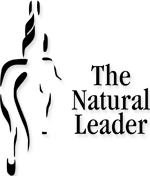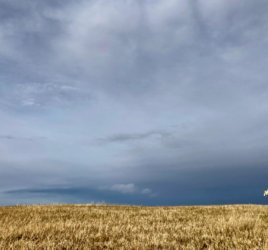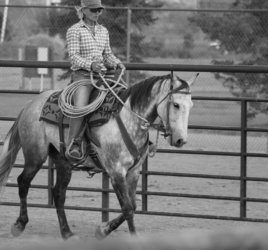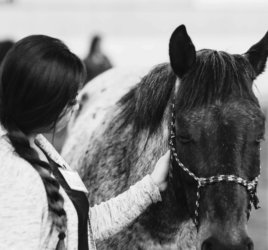My favorite activity of the Calgary Stampede is to visit to the Heavy Horse barn. In comparison to the Belgian, Clydesdale, Shires and Percherons, my big boy Seth a Percheron/Thoroughbred cross, looks pretty small.
Even in the noise of the grounds you can hear a team approaching long before you see them. The jingling and jangling of the harness and the rhythmic clopping of their huge shod feet are an unworldly noise. The first time my horses heard/saw a team hitched up, they had no idea it was “just horses” approaching.
It’s appropriate then, this months conversation is with David Farran about the team.
Listening to Understand
You could say David Farran is a life long entrepreneur. At 18 his first business venture was driving a team of horses in downtown Calgary.
DF – Our family farm was located where the Calgary neighborhood of Woodbine now covers. I grew up around horses, we hosted pony club at our place and I’ve had draft horses, since I was 18. I had an old guy teach me how to drive. My first team, Wiggle and Waggle, were named after goldfish I had as a kid.
My first great entrepreneurial adventure was in the early eighties, I got city planning permission to take tourists around downtown Calgary in a horse drawn wagon. That business lasted 2 summers, I then went off to university. I didn’t have another team for many years.

DF – Well it was a great responsibility taking care of a team in downtown Calgary – I was more concerned with preventing a disaster, though one memorable runaway was with Ralph Klein onboard. I was too young to even think about leadership.
I have always been entrepreneurial and very busy. After University one business was running a series of Vet Clinics, Vets got to practice Veterinary Medicine and we took care of the business. Over the past number of years, horses have been my grounding. When I was going 1000 miles an hour my horses forced me to get into a Zen state or a calmer level. Horses are like a sponge in that they pick up on your moods very easily.
DF – I spend a lot of time around draft horses and a lot of other peoples teams. We’re all learning. If you watch the people that have challenges with their horses, they are driving them like a motor car. They expect an immediate reaction not understanding there is a personality at the end of the lines.
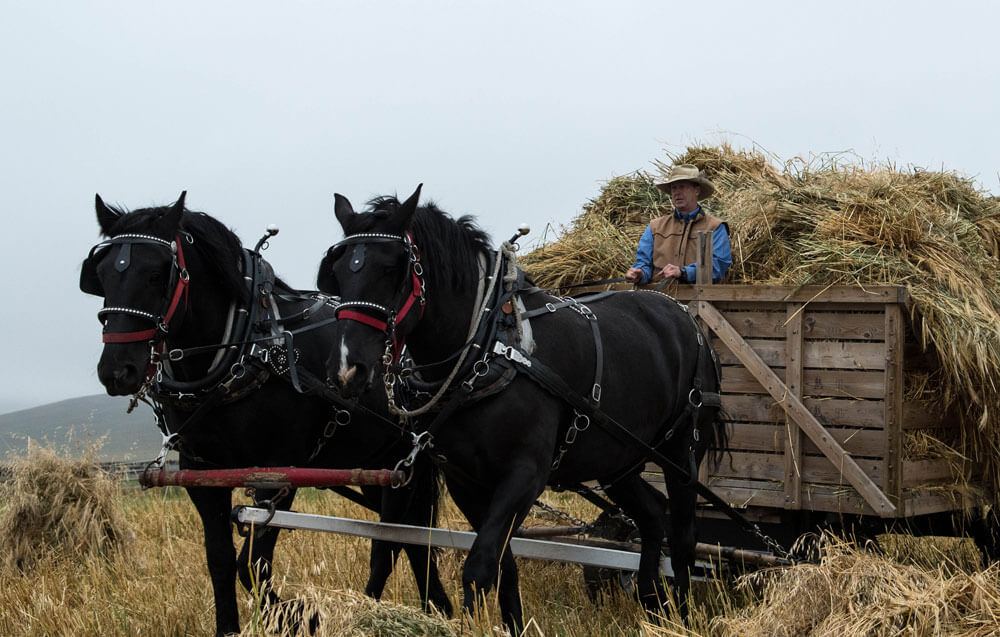 I’ve learned the horses need to have a job. If you don’t give them a focus, they’ll make up one for you and it might be something you’re not happy with.
I’ve learned the horses need to have a job. If you don’t give them a focus, they’ll make up one for you and it might be something you’re not happy with.
I don’t think that is any different than human beings. If you’re trying to be a leader without clear messaging and actually giving them on the job experience where there are tasks that are their responsibilities. They will go off in any direction they can.
Both the horse and human need to see their purpose and value.
If you leave a horse in the field for a couple of years you might need to reengage with them, but you need to do it patiently coaching them through the activity. You can’t bark at them when they are you prancing around but remind them “if you recall”. If you converse with them, they will respond. You have got to have that steady, steady level of patience.
DF – Don’t you wonder why the heck they listen to us! There is really no reason they should, but they do and they will pull 5x their weight, when they trust you. When you are clear and consistent in your messaging and they know what you are asking they will engage with you.
The idea of horses picking up on the subtlest of cues is so critical to your relationship with your teams. How has that influenced your ability as a negotiator, leader or entrepreneur? How do you believe that understanding of the importance of the relationship benefited you?
I would say in horsemanship you are always negotiating. The horses may be doing something that you think is wrong, but they don’t know that.
It’s really no different than in human relationships. Though we can talk we don’t always say what we mean. We all carry emotional baggage, or history, with us that influences our behavior and decisions. If you’re having that conversation when you aren’t really connecting maybe you have to look deeper to figure out why.
It’s not as complicated with horses. They are wary of what they may have encountered before. In fact horses are so logical we have trouble dealing with them as we are often looking deeper than we need to.
What is the greatest factor about leadership that horse’s have taught you?
DF – The horses force me to slow down and think about what I am doing, if I don’t they react and most often in a bad way. I don’t think that’s different in my day to day life, I can get pretty wound up. But getting wound up never helps, when I take a deep breath and navigate through this slower, things typically go better.
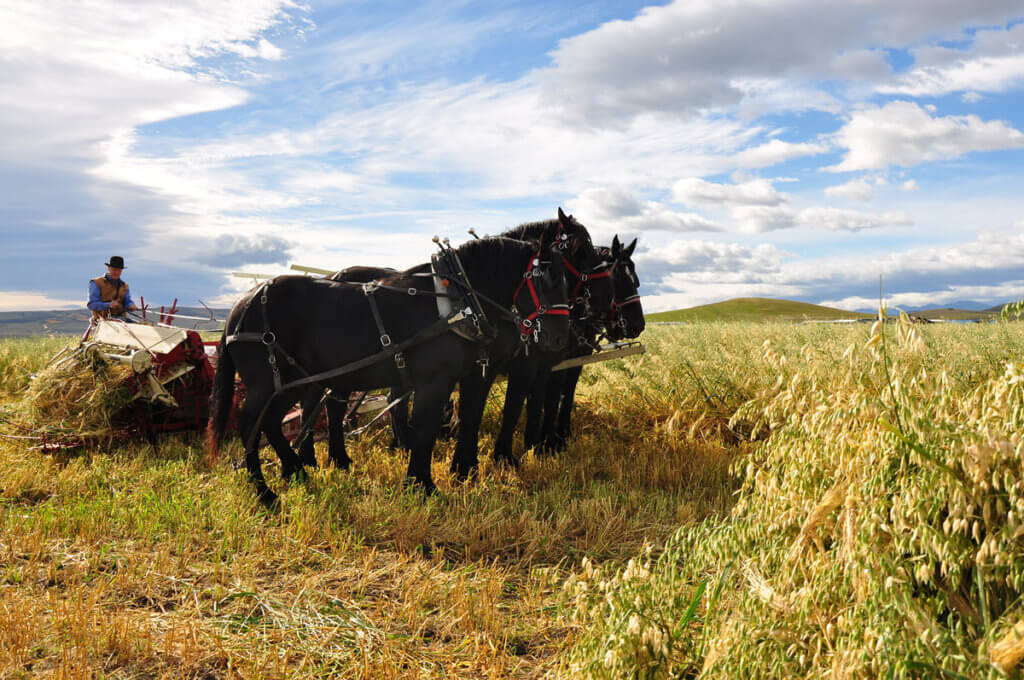 Driving draft horses is an incredible metaphor for teamwork.
Driving draft horses is an incredible metaphor for teamwork.
The absolute importance of two horses pulling their weight together so they can go further. If I let one horse slam their collar and the other horse freely go, they can’t pull anything. If the load isn’t even you get no results.
What started as a hobby gave the teamsters a purpose. Even a hobby needs a purpose so the idea was to create something traditionally – really connected to the soil and the land.
Now we can’t produce enough for the distillery. So horse farming gave us a purpose and it made us up our game. I had to buy a team that knew more than I did. If you are going to do something seriously you have to bring in the pros.
The horse equivalent is this team they have a university degree. I could train on the job but it was be smart to hire a distiller from Scotland so why not buy a team that brought the experience.
The black Percheron team is my one concession to vanity, they look so good all hitched up.
——
When I first connected with David he suggested getting him to stop talking about his horses might be the issue. We did talk for quite a long time and there are many more stories he shared – they will be added. David did want to leave readers with one key thought.
DF – What I would most love in life would be if I could get more people interested in draft horses. This is almost a pleas for the preservation of the draft horses because if people don’t buy them they will disappear. I believe a lot of people would prefer draft horses over riding horses, it could be the funnest thing they have ever done. Alberta Carriage does great programs for teaching people to drive. 4H, Pony Club, horse clubs all have stuff for kids to develop a lifelong love horses but you rarely, if ever, see big horses. Go to a draft horse event most people are over eighty, we need to change that if these breeds are to survive.
Thanks to David Farran for his time, his stories and his willingness to share the great shots of harvesting barley.
——
Nancy Lowery has been blogging about her Leadership Learning through Horsemanship Experiences for over ten years. This series began as “One Foot in the Arena” to explore what other leaders in Calgary have learned about their own leadership through their relationships with horses.
To explore how a day with horses can complement your Leadership Training programs Nancy would love to hear from you.
